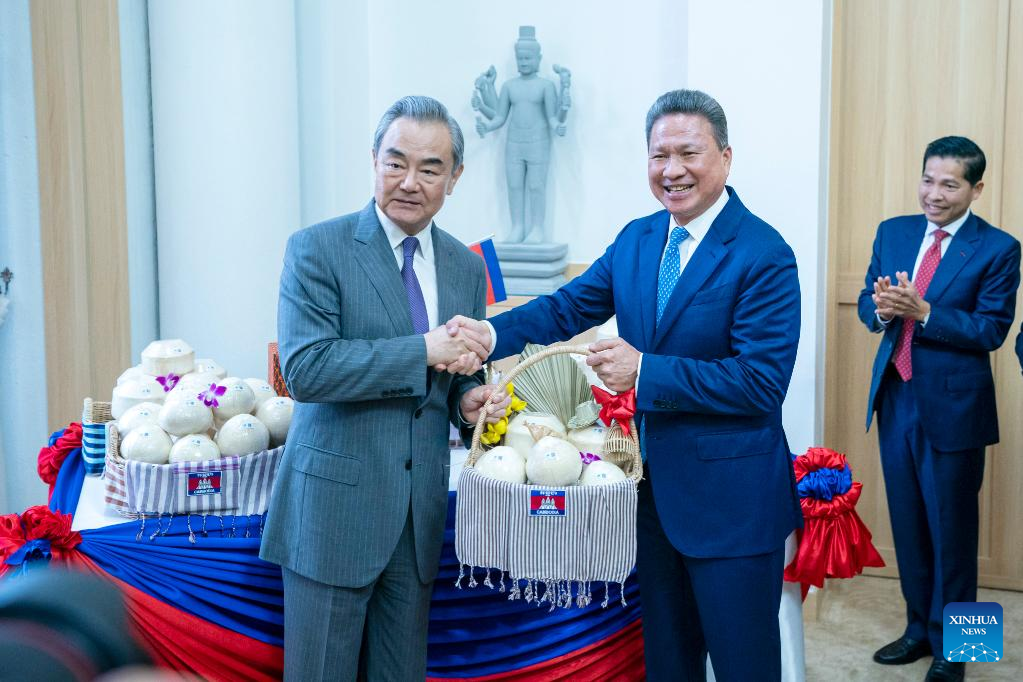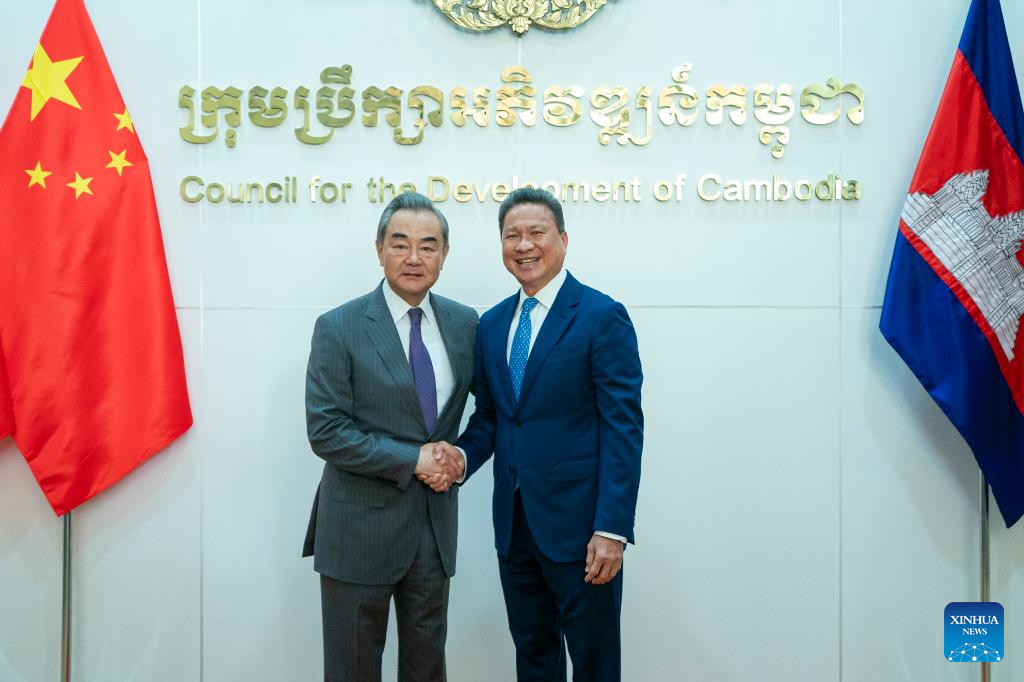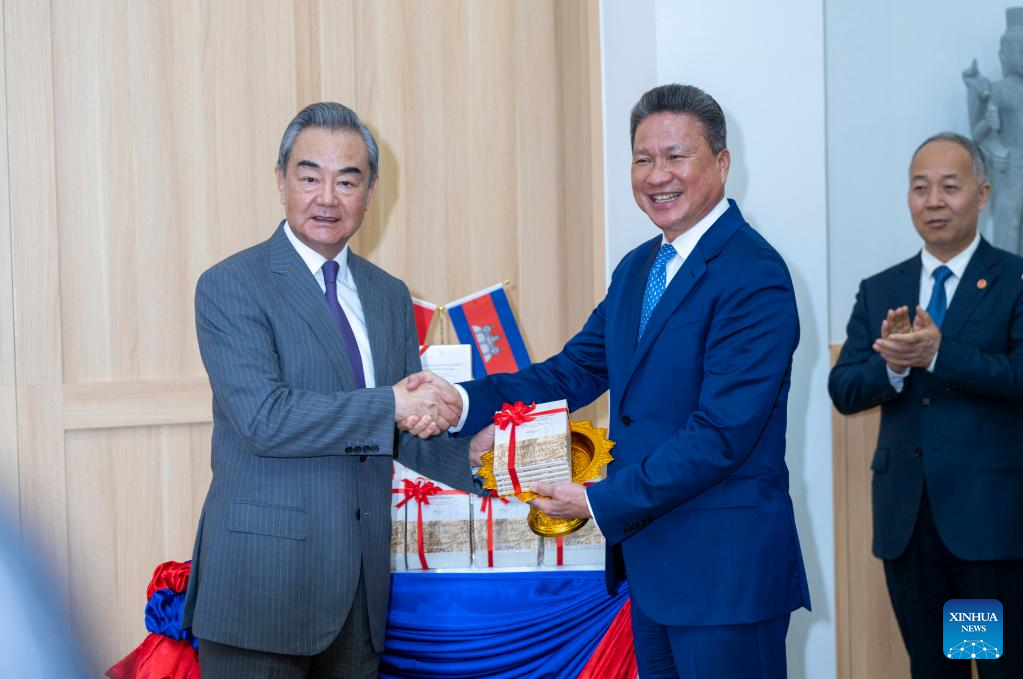
Chinese Foreign Minister Wang Yi, also a member of the Political Bureau of the Communist Party of China Central Committee, and Cambodian Deputy Prime Minister Sun Chanthol attend the launch event for Cambodian coconut's export to China after co-chairing the seventh meeting of the China-Cambodia Intergovernmental Coordination Committee in Phnom Penh, Cambodia, April 22, 2024. (Photo by Sovannara/Xinhua)
PHNOM PENH, April 22 (Xinhua) -- China and Cambodia on Monday pledged further efforts to advance the building of a high-quality, high-level, and high-standard China-Cambodia community with a shared future.
The two sides reached broad consensus on the direction for their efforts in the next stage of building the bilateral community and fully reviewed the implementation work of the community-building action plan during the seventh meeting of the China-Cambodia Intergovernmental Coordination Committee held in the Cambodian capital Phnom Penh.
The meeting was co-chaired by visiting Chinese Foreign Minister Wang Yi, also a member of the Political Bureau of the Communist Party of China (CPC) Central Committee, and Cambodian Deputy Prime Minister Sun Chanthol.
During the meeting, Wang noted that China and Cambodia enjoy an iron-clad friendship in line with the interests of the two peoples as well as the development trend of the times, boasting strong vitality and broad prospects.
Under the strategic guidance of the leaders of the two nations, the building of a China-Cambodia community with a shared future has become a model for forging a new type of international relations, Wang stressed.
He called for joint efforts to carry forward traditional friendship, consolidate political mutual trust, deepen all-around cooperation, enrich the Diamond Hexagon cooperation framework, and advance the projects to build the Industrial Development Corridor and the Fish and Rice Corridor.
Wang said China is willing to work with Cambodia to actively promote an equal and orderly world multipolarity and an inclusive economic globalization, contributing to the progress of humanity.
During the meeting, Chanthol spoke highly of China's remarkable achievements in the past 10 years, noting that Chinese-style modernization provides new options for countries in their modernization drives and brings new hope to overcoming global challenges.
He stressed the significance of the seventh intergovernmental meeting as being the first for the new Cambodian government and coming after the two countries upgraded their action plan to build a bilateral community with a shared future.
He said Cambodia will remain committed to the friendly cooperation with China, and is willing to work with China to implement the community-building action plan and deepen mutually beneficial cooperation to further benefit the people of both countries.
In the meeting, the Chinese side reaffirmed support for Cambodia in choosing a development path suitable for its national conditions and in safeguarding its national sovereignty, security, and development interests, and repeated firm opposition to external forces interfering in Cambodia's internal affairs.
The Cambodian side in the meeting reiterated its adherence to the one-China principle, recognizing Taiwan as an unalienable part of China's territory, while making clear its opposition to any attempt to use the Taiwan question to interfere in China's internal affairs and to any form of "Taiwan independence," and expressing support for all China's efforts to achieve national reunification.
Both sides agreed to intensify high-level exchanges, strengthen defense cooperation with continued joint exercises and training, and jointly crack down on online gambling, telecom fraud, drug trafficking and other transnational crimes.
The two sides agreed to accelerate the alignment of the China-proposed Belt and Road Initiative with Cambodia's Pentagonal Strategy, formulation of the Industrial Development Corridor cooperation plan, design work of the China-Cambodia railway, and implementation of the early harvest programs of the Fish and Rice Corridor.
They will also push ahead with the high-quality implementation of the China-Cambodia Free Trade Agreement, support the export of Cambodia's quality farm produce to China, and encourage more Chinese enterprises to invest in Cambodia.
Both sides agreed to take the 2024 China-Cambodia People-to-People Exchange Year as an opportunity to increase tourism exchanges, passenger flights, as well as practical exchanges between the youth, friendly organizations and at the subnational level.
The two sides pledged strengthened coordination at the Lancang-Mekong Cooperation mechanism, the China-ASEAN (Association of the Southeast Asian Nations) cooperation and other platforms.
Both sides believed that maintaining the hard-won peace and stability in the region and promoting regional development and prosperity are in the common interests of regional countries.
The two sides emphasized that they will fully and effectively implement the Declaration on the Conduct of Parties in the South China Sea, and work to advance negotiations towards an early conclusion of the Code of Conduct in the South China Sea.
After the meeting, Wang and Chanthol witnessed the signing of a series of bilateral cooperation documents such as on infrastructure construction and agricultural planning, and attended the launch event for Cambodian coconut's export to China. ■

Chinese Foreign Minister Wang Yi, also a member of the Political Bureau of the Communist Party of China Central Committee, and Cambodian Deputy Prime Minister Sun Chanthol co-chair the seventh meeting of the China-Cambodia Intergovernmental Coordination Committee in Phnom Penh, Cambodia, April 22, 2024. (Photo by Sovannara/Xinhua)

Chinese Foreign Minister Wang Yi (L), also a member of the Political Bureau of the Communist Party of China (CPC) Central Committee, and Cambodian Deputy Prime Minister Sun Chanthol attend a launch event for Khmer version of a Chinese book titled Customs of Cambodia in Phnom Penh, Cambodia, April 22, 2024. (Photo by Sovannara/Xinhua)



